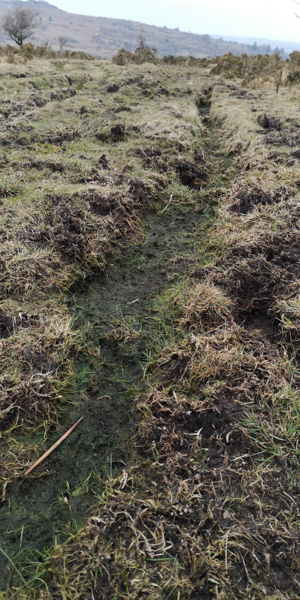Fieldnotes: Bodmin Moor 2023 (a bog)

Crumbs
Quiller-Couch, Arthur, and Daphne du Maurier. Castle Dor. Paperback edition. London: J.M. Dent & Sons, 1962. Reprint, London: Virago Press, 1994.
du Maurier, Daphne. The House On The Strand. Paperback edition. London: Victor Gollancz, 1969. Reprint, Harmondsworth: Penguin Books, 1971.
du Maurier, Daphne. Jamaica Inn. London: Gollancz, 1936. Reprint, Virago, 2015.
du Maurier, Daphne. Vanishing Cornwall. First edition. London: Victor Gollancz Limited, 1967.
du Maurier, Daphne. Enchanted Cornwall: Her Pictorial Memoir. Edited by Piers Dudgeon. Paperback edition. 1989. Reprint, London: Penguin Group, 1989.
du Maurier, Daphne. The Rebecca Notebook And Other Memories. Paperback. London: Victor Gollancz Ltd, 1981. Reprint, London: Arrow, 1993.
When walking involves wading through literal bullshit, facing rams head-on, negotiating space with herds of wild horses, hopscotching through bogs, electively sleeping rough in locations in rough climates, navigating through fog and collapsed bog-produced crevasse… coming up to the edge of impossible features fissures to find routes through open landscapes without path or signpost, landscapes that others refuse to cross for a variety of reasons … when Folx do so with neither the training or permission of those meant to those assigned to support … a small anxiety grows that isn’t fear of navigating the landscape. It is an anxiety around other folx responding to your choices. The term ‘self-supported’ (walks, education, ‘a life’) takes on a more complex meaning. Judgement, resources, resilience, fortitude, character, fitness, all are a matter of perspective. When your life is off path and out of the ordinary, people get nervous and those anxieties generate atmospheres where ‘support’ is questioned and withdrawn.
That skill of sleeping rough and navigating unhospitable environments is interpreted as exceptional. And as matter-of-fact I can state something about liking cold and damp after a lifetime of too hot and too dry, folx feel compelled to show either concern or disdain for choices that generate a certain kind of peace-of-mind moorlands can bring. These ‘fields’ are left for those outside, away from the resources of population centres: farmers, travellers, tramps, survivalists, miners. Encountering a bog is a sign of instability, stuck-ed-ness, decomposition, being trapped. There is death in a bog.
Perhaps ‘outsiders’ can find their own resources, in the dark, while no one is looking too closely. Institutions are put in place for health care, clean water, food, transportation, and access to hospitable land under equal access to basic human needs. So, the bodies that matter become those who submit to live inside the institutions that provide them without considering how the institutions are shaped to distribute resources evenly via terms set by the institution. Or, if they do, the hand only extends as far as comfort levels allow. Once what ‘matters’ becomes institutionalised, the categories are rearranged and frequently mishandled. Restitution and the redistribution of resources still require common agreement that those outside the walls will never get to vote on. We all need basic resources – but ‘accommodation’ is never the right fit. The gatekeepers always determine who gets them and who does not.
So there I am, navigating bogs and fogs, regardless of their absence in my life. This is in part due to a specific education, in a specific time (1980s / early 90s) and in a specific place (Californian during the age of AIDS, riots, fires, and mudslides). Students needed experiential learning to reach beyond the day-to-day experience of watching both the earth and society collapse around them. A California public education who saw this issue and decided to experiment with solutions. I learned to sleep rough, understand elevation, find ways around obstacles, look for the hands that are extending, and cope with a perception from others that gaining these skills means there was some dis/ability. Less time in a desk memorising, listening, and reading was a result of an inability to do so. I gained a compass and map reading skills to get myself through shifting environments. I did not realise at the time that these skills will be applied in the context of scholarly research.
I gained a sense about when and when not to trespass and when help may not arrive. People like to help, but sometimes they do not want to get stuck in the mud and that is that.
Now there are an assortment of maps includes the extraterrestrial imaging of the international space stations and companion satellites. The view of the big picture is more easily accessible and understood, agreed upon. The eye in the sky has confirmed the features and topography of what is lost in fog and bog. The images better inform us about where the obstacles and barriers might be, but do little to support a skill in navigating them. Suggestions, not instructions.
It’s forty years later, halfway across the globe. Bodmin Moor and Southern Californian are desolate sides of different coins. Cold and damp, hot and dry. Hidden below the surface is something more, or perhaps nothing at all. Carbon is locked in and then released into the atmosphere. The wind carries it off somewhere distant off the coastline. Too much water, no water. Water diverted. Big sky but can’t see ahead. It smells salty and industrial all at once. A waft of manure from somewhere in the distance. Many people write about it; they see something that others do not. A pervasive myth emerges regardless.
“You may think you know what you’re dealing with, but believe me, you don’t.1Polanski, Roman. Chinatown. USA, 1974. https://www.imdb.com/title/tt0071315/.“
Chinatown.
Jamaica Inn.
“Because I want to; because I must; because now and forever more this is where I belong to be.2du Maurier, Daphne. Jamaica Inn. London: Gollancz, 1936. Reprint, Virago, 2015.“
Neuroqueer Inquiry
This is a work-in-process, documenting dyspraxis in action. Unconventional syntax and organization are left intact, and updates occur on occasion when new connections or information emerges.





Footnotes
- 1Polanski, Roman. Chinatown. USA, 1974. https://www.imdb.com/title/tt0071315/.
- 2du Maurier, Daphne. Jamaica Inn. London: Gollancz, 1936. Reprint, Virago, 2015.




